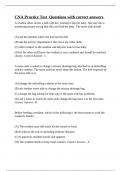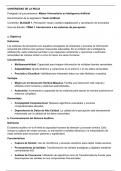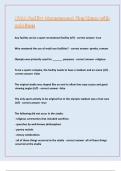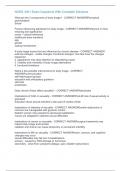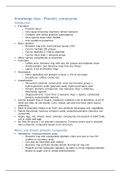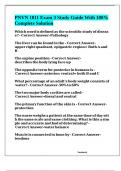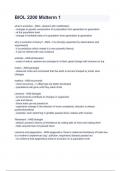From Theory To Intervention
General information
In this course, you will become acquainted with developing, setting up, implementing, and
evaluating interventions that aim to change behavior in the area of health and wellbeing,
social and consumer behavior, and in the organisational area
• Good physical and mental health, as well as job performance, interpersonal
relationships, and prosocial behavior are largely dependent on how people behave
o Promoting these behaviors is a complex matter
• It is essential to systematically develop evidence-based interventions that are based
on theoretical insights → during this course, we will follow guidelines from the PATHS
approach (problem-analysis-test-help-success) as well as related approaches to
intervention development
Examination
• Exam Wednesday October 9 → 8:30-10:30 → 40% of final grade
• Final assignment → November 1 → 17:00 → 60% of final grade
1
,Chapter 1 → Applying Social Psychology
This chapter lays the foundation for understanding how social psychology can be practically
applied to solve real-world problems
• Social psychology → dual role as both a basic and applied science → it seeks to
understand human behavior in social contexts and can be used to design
interventions that address societal challenges
o Scientific study of how individuals’ thoughts, feelings, and behaviors are
influenced by the real, imagined, or implied presence of others
o Focused on building generalizable knowledge about human behavior, often
through controlled experiments and surveys
• Chapter introduces PATHS model → a systematic approach to problem-solving that
ensures that interventions are grounded in scientific understanding and thoroughly
tested for efficacy
Relevance of social psychology to society → addressing social problems, many of which are
deeply rooted in human behavior
• It can help explain why numerous challenges in society persist and they also offer
evidence-based solutions
• Authors use the example of HIV/AIDS crisis in sub-Saharan Africa to demonstrate
how social psychology can be applied to real-world problems
o This region has one of the highest rates of HIV infection globally, and despite
advances in medical treatment in Western countries, many people in Africa
lack access to adequate healthcare and social support
o Case study illustrates how social psychological theories can e used to address
both the spread of the disease and the lack of support for victims
The PATHS model: a systematic approach to problem-solving → it is an acronym for five
essential steps, each step guides practitioners through the process of designing,
implementing and evaluating interventions
1. Problem definition → clearly define the problem
a. Crucial for understanding the scope of the issue and for designing an effective
intervention
2. Analysis → analyse problem using social psychological theories
a. Crucial for identifying the underlying causes of the problem and for developing
a theory-based explanation
3. Test → once the analysis is complete, the next step is to develop ad test a process
model, which outlines the key variables that influence the problem and the
relationship between them
a. Involves assessing whether the proposed relationships between variables
hold up under empirical scrutiny
4. Help → designing and implementing an intervention based on the tested model
a. Might involve creating a campaign
5. Success → evaluate the success of the intervention
a. Measuring the extent to which the intervention achieved its goals and
identifying areas for improvement
2
,Challenges of applying social psychology
• Oversimplification → much of research is based on laboratory experiments → may
not always reflect the complexities of real-life situations
o May not capture full range of factors that influence behavior in real world
• External validity → all kinds of factors in real life may obscure the impact of the
variables that are so clearly manipulated in experiments
o Practitioners should not uncritically trust a single study, but should also
consider the quality of the evidence underlying it
• Contradictory findings are sometimes produced
o Practitioners must carefully evaluate the evidence and consider the specific
context in which the intervention will be implemented
3
, Lecture 1 → intro to FTTI
Aim of the course → designing an intervention in a structured way
PATHS Approach in book and knowledge clips → evidence-based approach, take it step by
step → analyzing the problem, connecting theory to practice, behavior change strategies,
reporting to a ‘client’
Behavior → many societal, health and wellbeing, and organizational issues are dependent
on or influenced by human behavior
Some core theory concepts
• Intention → intention-behavior gap → people want something, but it doesn’t mean
that they are actually going to do that
o Self-regulation
• Automatic behavior → habits, impulse, nudging (intervention technique, making it
easier for people to make an healthy choice, without them being aware)
• Norms → injunctive (what we should be doing), descriptive (what we observe in
others, example of putting your camara on with a lecture)
Interventions
• Who has this knowledge?
• Who makes these interventions?
• Interventions don’t always target the actual determinants, for example
o Providing information/education/knowledge
o Telling people what to do
o Trying to scare people into behaving a certain way
Effective behavior change → assumption: attitude → intention → behavior
• For example → yelling at medical personnel is wrong, I should not do that →
aggression decreases
• Underage drinking is dangerous, so lets not do that → drinking behavior decreases
• Snacking on sugary and fatty foods is unhealthy, so I will no longer do that →
consumption and body weight decreases
o This is not always the case, just telling them negative effects doesn’t always
work
• Theory of planned behavior → bigger
things affecting intentions
• Supported by Meta-analysis on
intention-behavior association (Webb &
Sheeran, 2006) → successful
interventions lead to medium to large
effects on intention, and small to
medium effects on behavior
o All the intentions that you form,
only 28% leads to actual
behavior change → means that a lot of behavior happens without intention
o Moderators → interacts with the effects → control, habit, impulse and social
context people are in
4
General information
In this course, you will become acquainted with developing, setting up, implementing, and
evaluating interventions that aim to change behavior in the area of health and wellbeing,
social and consumer behavior, and in the organisational area
• Good physical and mental health, as well as job performance, interpersonal
relationships, and prosocial behavior are largely dependent on how people behave
o Promoting these behaviors is a complex matter
• It is essential to systematically develop evidence-based interventions that are based
on theoretical insights → during this course, we will follow guidelines from the PATHS
approach (problem-analysis-test-help-success) as well as related approaches to
intervention development
Examination
• Exam Wednesday October 9 → 8:30-10:30 → 40% of final grade
• Final assignment → November 1 → 17:00 → 60% of final grade
1
,Chapter 1 → Applying Social Psychology
This chapter lays the foundation for understanding how social psychology can be practically
applied to solve real-world problems
• Social psychology → dual role as both a basic and applied science → it seeks to
understand human behavior in social contexts and can be used to design
interventions that address societal challenges
o Scientific study of how individuals’ thoughts, feelings, and behaviors are
influenced by the real, imagined, or implied presence of others
o Focused on building generalizable knowledge about human behavior, often
through controlled experiments and surveys
• Chapter introduces PATHS model → a systematic approach to problem-solving that
ensures that interventions are grounded in scientific understanding and thoroughly
tested for efficacy
Relevance of social psychology to society → addressing social problems, many of which are
deeply rooted in human behavior
• It can help explain why numerous challenges in society persist and they also offer
evidence-based solutions
• Authors use the example of HIV/AIDS crisis in sub-Saharan Africa to demonstrate
how social psychology can be applied to real-world problems
o This region has one of the highest rates of HIV infection globally, and despite
advances in medical treatment in Western countries, many people in Africa
lack access to adequate healthcare and social support
o Case study illustrates how social psychological theories can e used to address
both the spread of the disease and the lack of support for victims
The PATHS model: a systematic approach to problem-solving → it is an acronym for five
essential steps, each step guides practitioners through the process of designing,
implementing and evaluating interventions
1. Problem definition → clearly define the problem
a. Crucial for understanding the scope of the issue and for designing an effective
intervention
2. Analysis → analyse problem using social psychological theories
a. Crucial for identifying the underlying causes of the problem and for developing
a theory-based explanation
3. Test → once the analysis is complete, the next step is to develop ad test a process
model, which outlines the key variables that influence the problem and the
relationship between them
a. Involves assessing whether the proposed relationships between variables
hold up under empirical scrutiny
4. Help → designing and implementing an intervention based on the tested model
a. Might involve creating a campaign
5. Success → evaluate the success of the intervention
a. Measuring the extent to which the intervention achieved its goals and
identifying areas for improvement
2
,Challenges of applying social psychology
• Oversimplification → much of research is based on laboratory experiments → may
not always reflect the complexities of real-life situations
o May not capture full range of factors that influence behavior in real world
• External validity → all kinds of factors in real life may obscure the impact of the
variables that are so clearly manipulated in experiments
o Practitioners should not uncritically trust a single study, but should also
consider the quality of the evidence underlying it
• Contradictory findings are sometimes produced
o Practitioners must carefully evaluate the evidence and consider the specific
context in which the intervention will be implemented
3
, Lecture 1 → intro to FTTI
Aim of the course → designing an intervention in a structured way
PATHS Approach in book and knowledge clips → evidence-based approach, take it step by
step → analyzing the problem, connecting theory to practice, behavior change strategies,
reporting to a ‘client’
Behavior → many societal, health and wellbeing, and organizational issues are dependent
on or influenced by human behavior
Some core theory concepts
• Intention → intention-behavior gap → people want something, but it doesn’t mean
that they are actually going to do that
o Self-regulation
• Automatic behavior → habits, impulse, nudging (intervention technique, making it
easier for people to make an healthy choice, without them being aware)
• Norms → injunctive (what we should be doing), descriptive (what we observe in
others, example of putting your camara on with a lecture)
Interventions
• Who has this knowledge?
• Who makes these interventions?
• Interventions don’t always target the actual determinants, for example
o Providing information/education/knowledge
o Telling people what to do
o Trying to scare people into behaving a certain way
Effective behavior change → assumption: attitude → intention → behavior
• For example → yelling at medical personnel is wrong, I should not do that →
aggression decreases
• Underage drinking is dangerous, so lets not do that → drinking behavior decreases
• Snacking on sugary and fatty foods is unhealthy, so I will no longer do that →
consumption and body weight decreases
o This is not always the case, just telling them negative effects doesn’t always
work
• Theory of planned behavior → bigger
things affecting intentions
• Supported by Meta-analysis on
intention-behavior association (Webb &
Sheeran, 2006) → successful
interventions lead to medium to large
effects on intention, and small to
medium effects on behavior
o All the intentions that you form,
only 28% leads to actual
behavior change → means that a lot of behavior happens without intention
o Moderators → interacts with the effects → control, habit, impulse and social
context people are in
4


